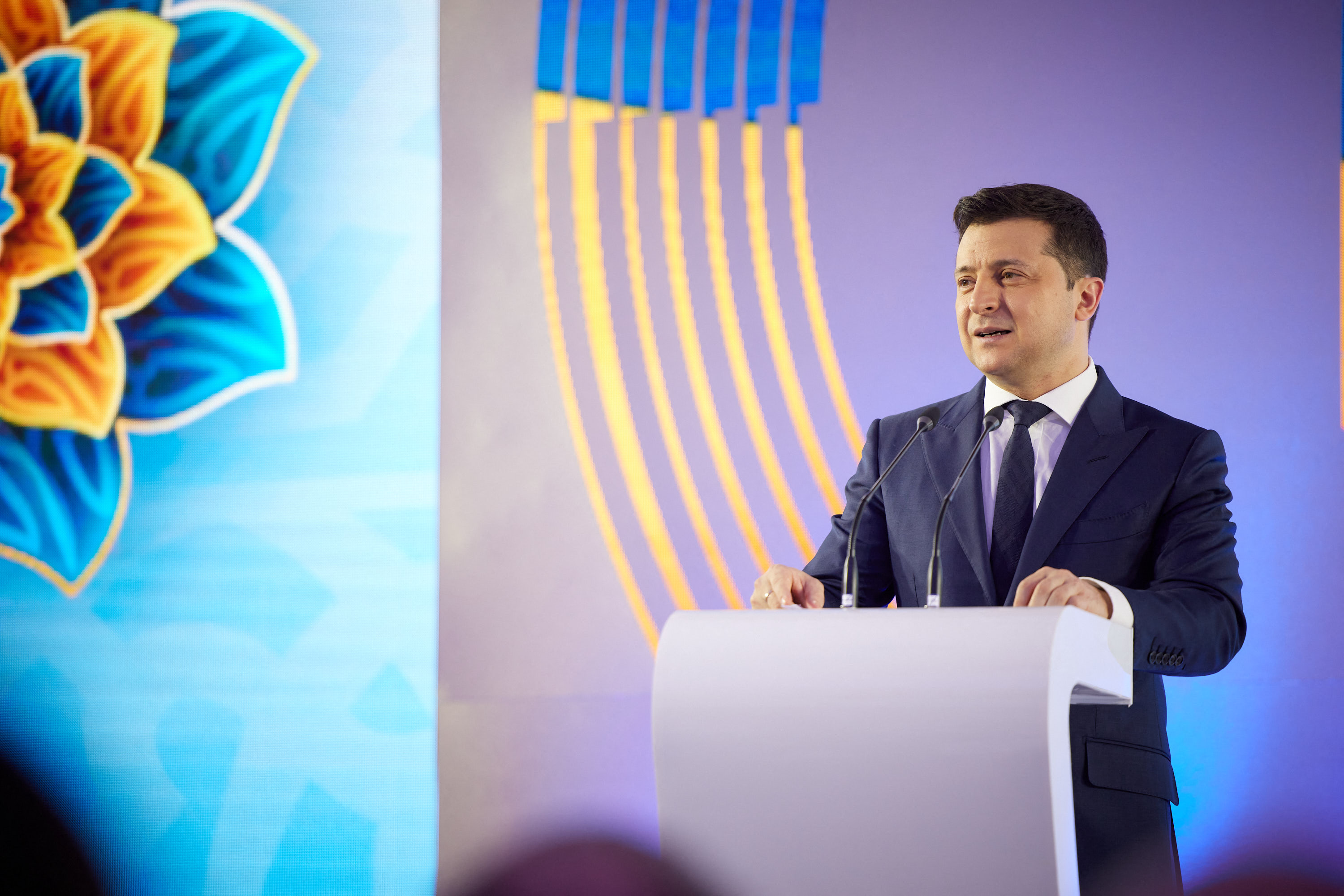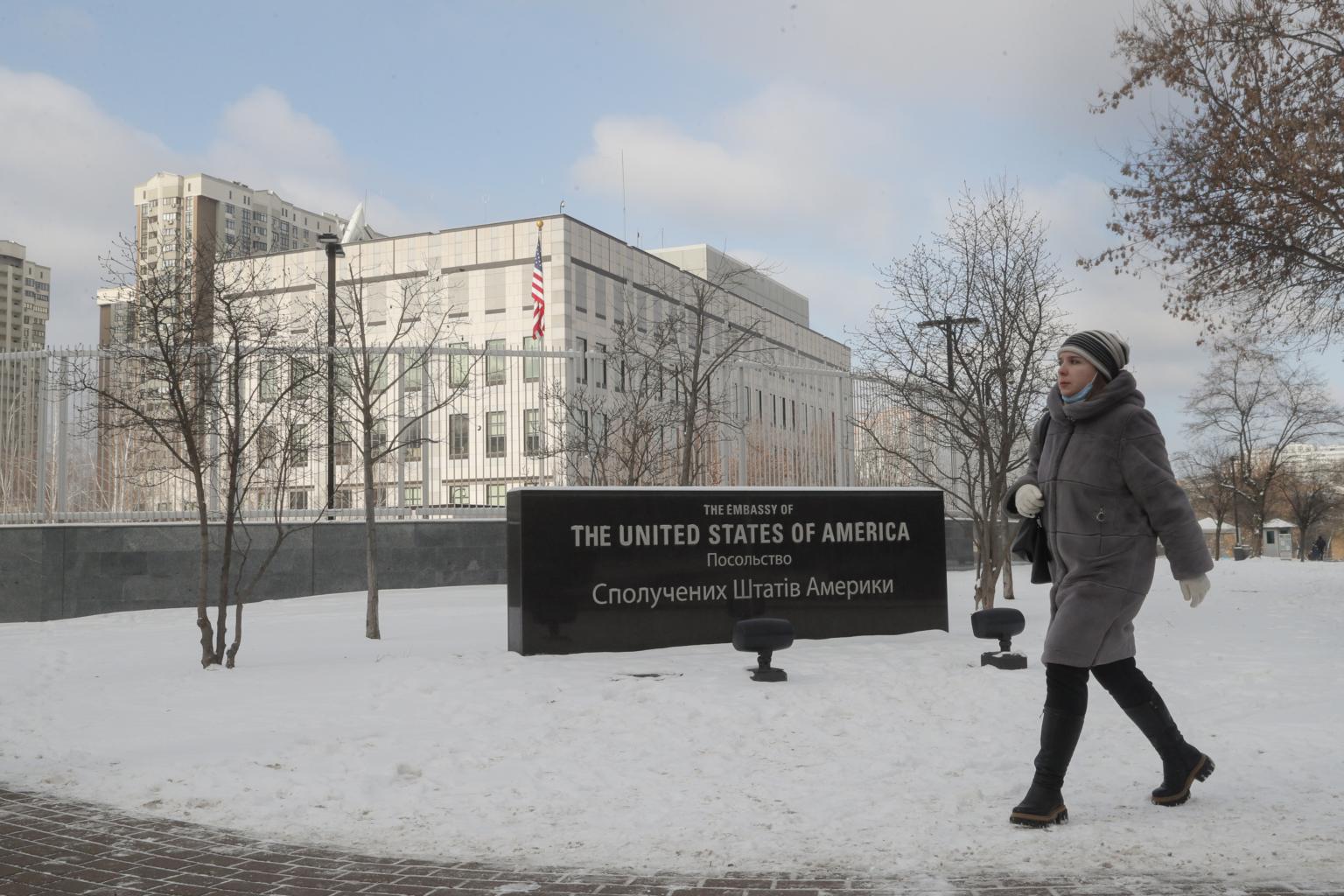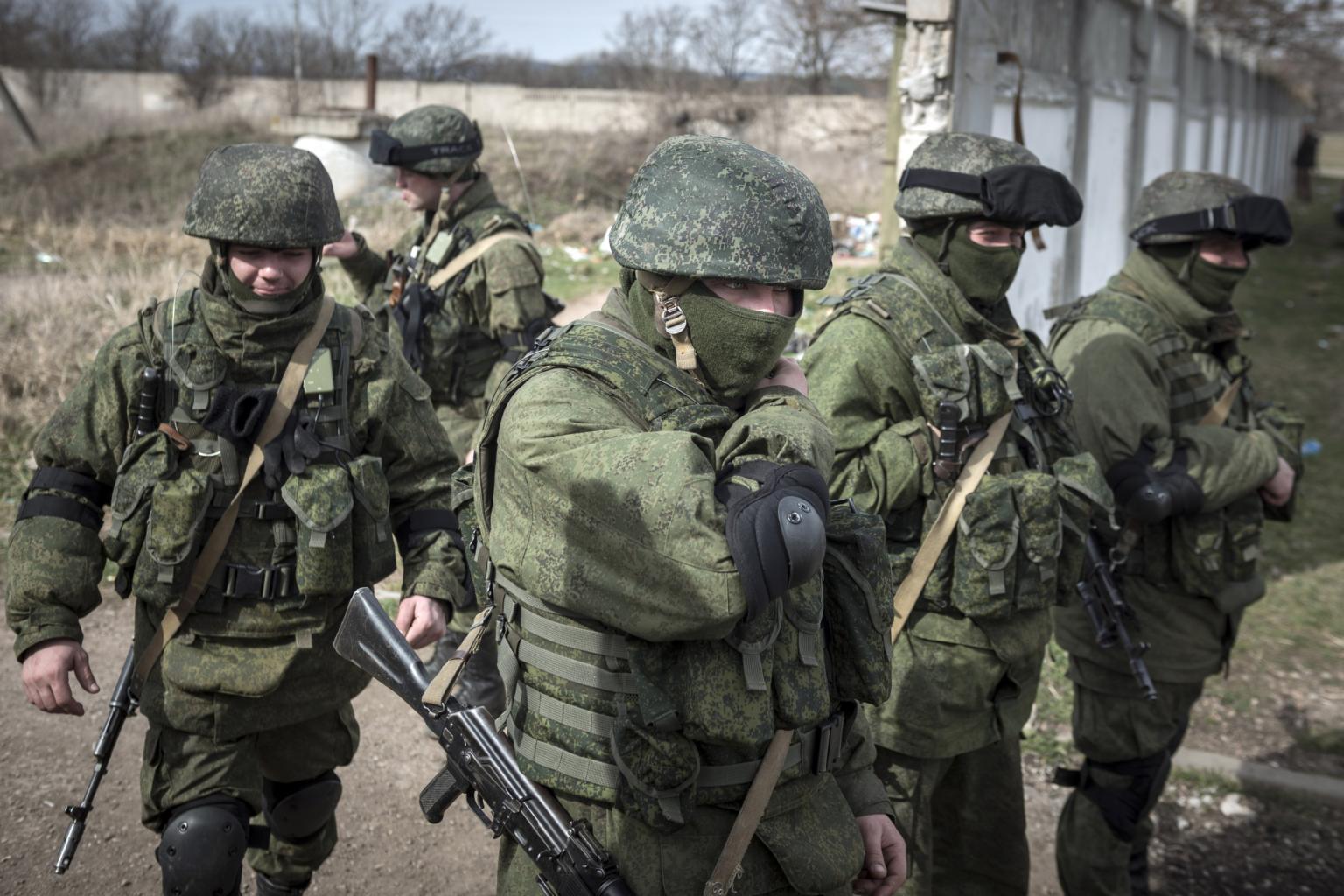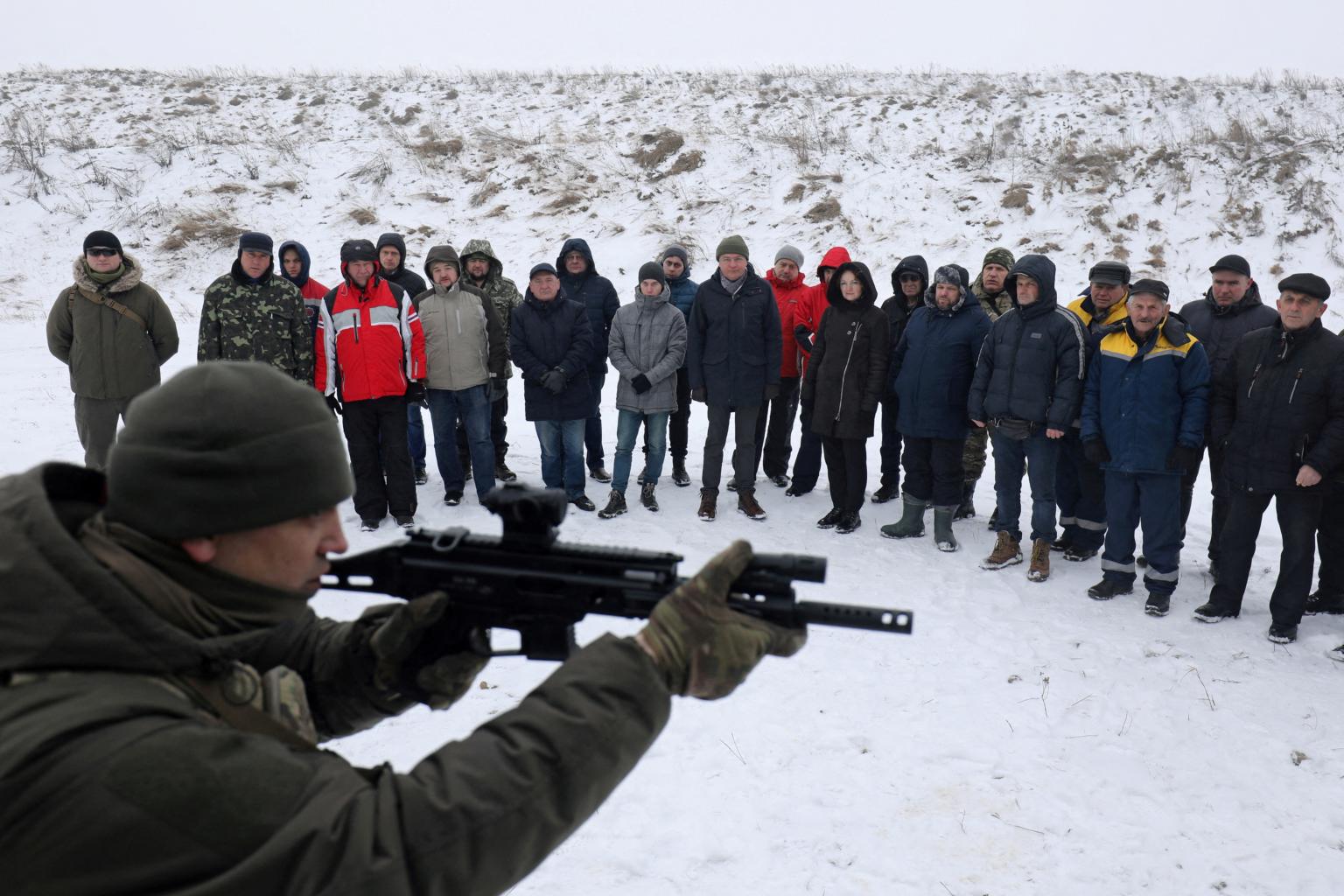As West warns of Russian attack, Ukraine sends different message
Sign up now: Get ST's newsletters delivered to your inbox

Ukraine's leaders, such as President Volodymyr Zelenskyy (pictured) and its defence minister, are playing down the Russian threat.
PHOTO: AFP/UKRAINE PRESIDENCY
Follow topic:
KIEV (NYTIMES) - Russia's military build-up on the Ukrainian border is easy to see. Satellite images show ever-growing patches of snow-covered tanks expanding along the frontier, and a stream of Russian TikTok posts records the steady westerly crawl of trains carrying missile launchers, armour and troops.
And yet despite the build-up - and even with the United States warning that an attack could come imminently, and Nato forces on alert - Ukraine's leadership is playing down the Russian threat.
That posture has left analysts guessing about the leadership's motivation, with some saying it is to keep the Ukrainian markets stable, prevent panic and avoid provoking Moscow, while others attribute it to the country's uneasy acceptance that conflict with Russia is part of Ukraine's daily existence.
On Tuesday (Jan 25), Russia announced a flurry of military drills, from the Pacific Ocean to its western flank around Ukraine, a demonstration of the vast reach of its forces.
And, wary of the threat that Russia could turn off fuel sales to Europe in the depths of winter, the Biden administration is making plans for gas and crude oil suppliers from the Middle East, North Africa and Asia to bolster supplies to Europe in the coming weeks.
But as the Kremlin and the West square off, Ukrainian officials are projecting an air of calm.
Already this week, Ukraine's defence minister has asserted that there had been no change in the Russian forces compared with a build-up in the spring; the head of the national security council accused some Western countries and news media outlets of overstating the danger for geopolitical purposes; and a Foreign Ministry spokesman took a swipe at the US and Britain for pulling the families of diplomats from their embassies in Kiev, saying they had acted prematurely.

This week's proclamations came after an address to the nation last week by Ukrainian President Volodymyr Zelenskyy, in which he asked, "What's new? Isn't this the reality for eight years?"
On Tuesday evening, Mr Zelenskyy weighed in on the embassy withdrawals, insisting in a Facebook post that this "did not mean escalation is inevitable".
How to interpret the threat from Russian troops and equipment massed at Ukraine's border is a subject of intense debate. Ukraine's own military intelligence service now says there are at least 127,000 troops on the border, significantly more than were deployed by Russia in the spring build-up.
That number does not yet include the troops and equipment arriving now in neighbouring Belarus, a Russian ally, before military exercises next month. The US says those drills could be used as a pretext to place forces within striking distance of Ukraine's capital, Kiev.
Even so, in an interview on Monday with Ukrainian television station ICTV, Ukrainian Defence Minister Oleksii Reznikov seemed to wonder what all the fuss was about.
"Today, at this very moment, not a single strike group of the Russian armed forces has been established, which attests to the fact that tomorrow they are not going to invade," Mr Reznikov said. "That is why I ask you to not spread panic."
There are different reasons for the disconnect in messaging between Ukrainian officials and their American counterparts, analysts say. Mr Zelenskyy must be deft in crafting a message that keeps Western aid flowing, does not provoke Russia and reassures the Ukrainian people.
And after eight years of war with Russia, experts say, Ukrainians simply calculate the threat differently than their Western allies.

In 2014, Russian commando units seized the Crimean peninsula, and Russian-backed separatists tried to claw away two eastern Ukrainian provinces. Troops are dug into trenches on both sides of a so-called line of contact that frequently crackles and pops with small-arms and mortar fire. More than 13,000 people have been killed in the conflict.
"We understand the plans and intentions of Russia; for us, crying out from fear is not necessary," Mr Oleksii Danilov, head of Ukraine's national security and defence council, said in an interview with the BBC published on Monday.
Mr Danilov and others in the Ukrainian government argue that sowing panic and disarray within Ukrainian society is as much a part of the Russian strategy as any eventual military action. So showing fear, even if there is a basis for it, is only handing their enemies a victory before a single shot is fired.
"The No. 1 task of Russia is the shattering of the internal situation in our country," Mr Danilov said. "And today, unfortunately, they are doing this successfully. Our task is to do our jobs in a calm and balanced environment."
The US has its own reasons for the way it has called out the Kremlin of late. Washington has to send a strong message both to Moscow and to allies in Europe, like Germany, who might be more hesitant to take a robust stance against Russia, said Ms Maria Zolkina, a political analyst with the Democratic Initiatives Foundation, a Kiev-based think-tank.
But there is a risk that Washington's messaging, which includes putting 8,500 troops on "high alert" for possible deployment to Nato's eastern frontier, could provoke the Kremlin further, or at least be used to justify a more aggressive posture.
On Tuesday, Mr Dmitry Peskov, the Kremlin's spokesman, said Moscow was watching Nato troop movements "with profound concern".
Not everyone in the country agrees with the current government's approach. Last weekend, the leaders of Ukraine's varied and often raucous political opposition pressed Mr Zelenskyy to set aside calls for calm and prepare the country for war.

A collection of Parliament members from different parties, as well as the former president, prime minister and foreign minister, signed a communique calling on Mr Zelenskyy to mobilise Ukraine's forces to confront "the deadly threat from Russia that is looming over Ukraine".
"He believes that if he scares the Ukrainian people, his approval rating will go down," Mr Arseniy Yatsenyuk, who was Ukraine's prime minister when the war broke out in 2014, said of Mr Zelenskyy. "If Russia starts its invasion, we have to forget about politics and the approval rating in this country because I'm not sure we will have a chance to have our next parliamentary or presidential elections."

